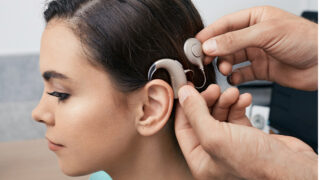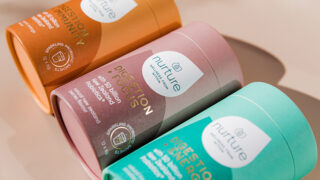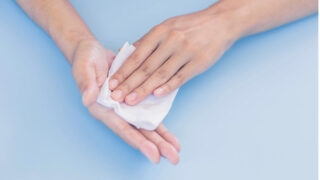Nope, leaking urine is not normal – and it’s not something a woman should just have to deal with. In honour of Bladder Health Awareness Month, we’re taking the taboo out of the topic of female urinary incontinence. Here’s what to know about this type of pelvic floor dysfunction, what causes it and how a urogynaecologist can help.
So, leaking urine isn’t just a passing phase?
While it can sometimes be temporary – for instance, during a urinary tract infection – urinary incontinence is usually a long-term condition for most women, says DR NG KAI LYN, an obstetrician and gynaecologist with a specialty in female bladder and pelvic floor dysfunction. Known as a urogynaecologist, this type of specialist is trained in the diagnosis and treatment of women’s pelvic floor disorders. Urinary incontinence is one of the many pelvic floor disorders she commonly treats.
“There is a misconception that has been passed down from the older generations who have accepted leaking urine as a normal part of ageing. Or, worse, part of being a woman.”
Why the taboo?
While urinary incontinence is quite common, it still remains a bit taboo, explains Dr Ng.
“Urinary incontinence is thought of as something that women just have to ‘deal’ with, amongst the many other challenges that women face,” she says. “It’s a ‘hidden’ condition that doesn’t usually display outward signs of illness or disease. So, it’s been grossly overlooked, despite its significant impact on one’s quality of life.”
Also, Dr Ng says there’s a big lack of awareness in both women and their healthcare professionals on the topic of pelvic floor disorders in general. “It’s something akin to ‘don’t ask, don’t know, don’t exist’.”
Part of this, she says, stems from urinary incontinence being an awkward topic. “Most women are uncomfortable addressing something so central to their core bodily function. It almost seems like an embarrassing public admission to a loss of control over one’s body.”
“A pelvic floor dysfunction requires a lot of specialised expertise, patience and time. Therefore, most healthcare professionals tend to avoid addressing this altogether. Instead, they focus on problems that are more easily ‘fixed,'” says Dr Ng.
“I firmly believe that the time when pelvic floor disorders are swept under the rug, or dismissed by unsuspecting healthcare professionals, is over. We, as women, deserve a good quality of life at every stage of our gynaecological timeline – especially since we put our bodies through so many changes throughout our lives!”

What exactly is female urinary incontinence?
Female urinary incontinence is a common type of pelvic floor dysfunction that manifests in a loss of bladder control, either preceded by a sense of urgency (urge urinary incontinence), or on physical exertion like laughing, coughing, sneezing, jumping or jogging (stress urinary incontinence).
Causes of urinary incontinence
There are many causes of urinary incontinence. One of the most common is weakened pelvic floor muscles. This usually happens during pregnancy and childbirth; pelvic floor muscles can also weaken from ageing, menopause, nerve damage and obesity.
Factors that can worsen urinary incontinence include:
- drinking caffeine and alcohol;
- smoking;
- certain medical conditions such as asthma, chronic cough and diabetes; and
- certain blood pressure and heart medications
Here’s how a urogynaecologist can help
Of course, this condition can significantly impact a woman’s self-esteem and daily life, says Dr Ng.
“If you suspect you may have a pelvic floor disorder, it’s best to consult a urogynaecologist as opposed to a general gynaecologist,” says Dr Ng. “A urogynaecologist is a trained specialist with expertise in diagnosis, investigation and treatment of women’s pelvic floor disorders.”
A urogynaecologist can best determine what type of urinary incontinence you have, its severity and your treatment options.
Treatment for urinary incontinence
“Depending on your symptoms, treatment for urinary incontinence may first require a physical examination to check your vagina and pelvic floor tone for any co-existent pelvic organ prolapse, a pelvic and bladder ultrasound to check your uterus, ovaries and post-void residual urine, urine tests to exclude urinary tract infection and, possibly, urodynamic testing – a study to check bladder function and bladder muscle stability.”
Treatment also depends on what type of urinary incontinence you have. Often, conservative lifestyle changes may be sufficient to improve symptoms of urinary incontinence. Lifestyle changes may include:
- maintaining a healthy body mass index (BMI), as obesity results in chronic increased pressure on the pelvic floor muscles and further weakens them;
- adjusting your diet or fluid intake;
- cutting down on caffeinated drinks;
- bladder training – a technique that trains your bladder to hold more urine;
- taking scheduled toilet breaks;
- quitting smoking;
- improving control of medical conditions like diabetes and asthma, or changing medications after a discussion with your doctor;
- avoiding constipation; and
- doing pelvic floor exercises, including Kegel exercises

The treatment of stress urinary incontinence usually involves conservative and surgical options, while the treatment of urge urinary incontinence mainly revolves around conservative and medical options. If you have mixed urinary incontinence, treatment starts on the predominant type that bothers you the most; your urogynaecologist will be able to discuss these in further detail with you.
What happens if it goes untreated?
Urinary incontinence is not a life-threatening condition. However, it can affect your physical health and hygiene, and put you at increased risk of urinary tract infections if untreated, says Dr Ng.
Additionally, urinary incontinence can severely affect your self-esteem and body image.
“In the long-run, this may adversely impact your social life and relationships.” she says. So, empowering yourself by seeking help from a urogynaecologist from the get-go is a good idea.
Advanced Centre for Reproductive Medicine
#05-35 Gleneagles Hospital, Annexe block, 6A Napier Road
6474 3900 | acrm.com.sg
Like this? Read more in our Health & Fitness section.





